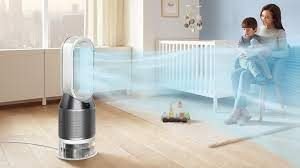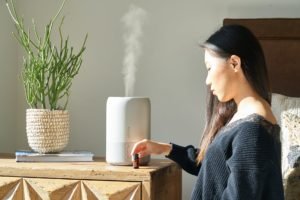Air Purifier Vs Humidifier Overview
Is air purifier or humidifier better for asthma? This is a common question many people ask when planning to buy an ideal home appliance that will help them maintain a healthy home atmosphere. The quality of indoor air and humidity levels in your home are very critical to your health and comfort especially if you have been diagnosed with asthma.
Table of Contents
Global statistics have shown that more than 20 million people in the world live with asthma condition. Asthma is a chronic inflammatory disease that affects your lungs by narrowing the airways and making them swell. Common asthma symptoms that manifests include; chest tightness, wheezing, shortness of breath, and coughing.
The presence of allergens in your indoor air is the main cause of irritation reactions. On the other hand, dry air (less humidity) means that your nose and throat will become dry and irritating thus increasing coughing and asthma attacks.
Also, high levels of humidity (wet air) triggers the growth and spread of allergens such as molds, dust mites and microbes thus, making breathing difficult as well as asthma control.
Both air purifiers and humidifiers have positive impact on the quality of indoor air that we breathe in our homes. So, which is better for asthma condition? The truth of the matter is that each of them serve a different purpose and you can need either of them or both depending on your unique situation.
The best way to know which is better is by identifying the common asthma symptoms and triggers that you experience frequently in your home so that you can know which one works perfectly to control such triggers.
What is the difference between an air purifier and a humidifier?
An air purifier is an air cleaning device that is used to remove air contaminants in a room to improve air quality. Air purifier sanitize the indoor air by absorbing air through a filter where pollutants, allergens, and toxins are trapped or by neutralizing the air pollutants without filtering them in the case of filter-less air purifiers.

Air purifiers are more efficient than air filters. While air filters are good at trapping air contaminant particles, air purifiers offer more benefits as they ensure that the indoor air is cleaned to improve its quality.
A humidifier is an electronic device that adds warm or cold moisture mist into the indoor air to regulate the humidity levels in your home or office. Low humidity levels will make your indoor air dry and this will make your nose and throat become dry and irritable this, making asthma condition difficult to control.
On the other hand, too much humidity in your indoor air will encourage the growth and spread of allergens and other air contaminants such as molds and dust mites which increases chances of asthma attacks. High humidity levels in the air also makes breathing difficult and can make asthma attacks worse.
Therefore, a humidifier should be used with caution to ensure that the right humidity levels (mostly 30-50%) is maintained so as to reduce asthma triggers.
Air purifier or humidifier; which is better for asthma?
Both air purifier and humidifier have a positive impact on the quality of indoor air that we breathe but they solve different problems. The best way to identify the perfect device to use in your home is by classifying the most prevalent asthmatic symptoms that you experience.
If your asthma attacks are triggered by allergens such as dust mites, pollen, smokes, and odors, buying an air purifier is recommended. If your asthma attacks are as a result of dry air, a humidifier is the most ideal device to buy so that it can help soothe the dry air by adding moisture to it.

Too much humidity in your indoor air is also not advisable as it makes your air damp and breathing becomes difficult. If you live in an area with too much humidity, using a dehumidifier is advisable to bring the humidity down to satisfactory levels.
It’s important to note that although a humidifier doesn’t cure asthma, it provides relief if your indoor air is dry and often affects your respiratory system.
Important factors to consider before you can use a humidifier in your home or office
You should exercise caution when using humidifiers and dehumidifiers. Below are some of the important facts that you need to keep in mind;
- A humidifier can make your asthmatic condition worse if you turn it on for a very long period or all-day-long. It will make your indoor air too much humid which is also another risk factor.
- Avoid filling your humidifier with tap water as it may contain minerals and other contaminants which may cause irritation to your airways and lungs.
- If you don’t clean your humidifier on a regular basis, it can make asthma attacks more prevalent and worse instead of reducing them. Bacteria and fungi can easily clog your humidifier and they get released in your indoor air making your asthma condition worse.
- When cleaning your humidifier, avoid using cleaning products that have bleaching agents or mixing them with other chemicals as this can cause irritation in your respiratory system.
Can you use both air purifier and humidifier in your home?
Yes, you can use both air purifier and humidifier in your home as they serve different purpose. An air purifier will help clean the air from allergens while a humidifier will ensure that your dry indoor air is moisturized to the optimum levels.
However, you should ensure that the two are not placed too close to each other. Having too much moisture close to your air purifier can affect how the HEPA air filter works by encouraging mold and bacteria growth due to increased dampness. It’s recommended that you place air purifier or humidifier at opposite sides of your room.

